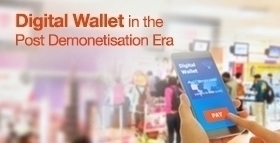Digital Wallet in the Post Demonetisation Era
January 06, 2018 | posted in News | posted by : Manappuram Finance
What is Digital Wallet?
A digital wallet refers to an electronic device that allows an individual to make mCommerce & mPayment transactions anywhere, anytime. Users can simply create and load a wallet/ account online or at the nearest shop/ franchisee/ office of a wallet service provider.
One Size Does Not Fit All
The western model of wallet usage and adoption is vastly different from India. Very high percentage of bank user base, card usage along with high POS and online shopping penetration has driven wallet usage on electronic platforms in western economies. On the other hand, India with its spread demographics, low banked base/ card usage/ branch - ATM spread, and offline heavy merchant payment/ shop trends is vastly different from the west in all aspects.
Importance for India
The Journey of wallets in India started with the aim to provide financial solutions and reach the unbanked population of India. Opening and managing branches/ ATM in tier two, three towns and villages is a tough ask and thus leaves the population who lack even with access to bank accounts facing hindrances in withdrawing/ depositing money and making payments.
The convenience and benefit of creating and loading a wallet as also availing retailer assisted payments/shopping at your nearest and familiar local shop is the single biggest virtue. This enables a wallet company with its existing wide distribution/ franchisee/ retailer model to reach customers even in far flung areas where a bank branch or ATM service is not available. The same distribution network enables fast growing offline adoption at merchant without the need for POS card machines or cards for customers. Wallets could also act as a data point sources for financial institutions enabling customers with no credit history/ credit/ debit card/ bank usage get access to loans from these institutions.
Win Win for India
Customers enjoy following the benefits: (i) mini bank next door (ii) anywhere, anytime recharge (iii) utility fee payments and shopping (iv) offline retail payments at shops even without POS machine (v) ease of person to person money transfer, etc.
Merchants / Agents / Franchisee enjoy benefits such as (i) no need to store cash (with all its risks) or access ATM`s for vendor payments (ii) digital payment acceptance without POS machine (and its associated costs) (iii) they can augment their income by offering digital wallet services to customer etc.
Society/ Employment: Provides employment opportunity especially to the rural people, to enrol as agents/ franchisee offering the wallet services to the local population
Government: It is estimated that the cost of cash in Indian economy is around 1.5 percent - 1.7 percent of real GDP in 2014-15. This alone indicates the potential savings that the digital wallets ecosystem provides for governments which could easily run into lakhs of crores of rupees over a period, besides widening the tax net (which could lead eventually to lower tax rates for all brackets).
To conclude, the digital wallet is a journey which needs strong support, nurturing and steady steps for further evolution which could lead to a destination likely to be win-win for all stakeholders.


